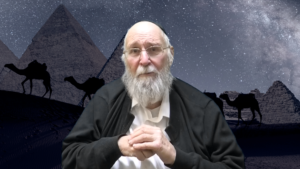- Faith ⬦ Read ⬦ Shabbat ⬦ Weekly Torah Portion
There’s No Benefit from Acting in Haste – Parshat Vayechi
One gains nothing by behaving in a reckless manner. Not only will a person gain nothing, but he stands to lose a great deal. This rule holds true both in the physical and the spiritual realms. This is one of the messages of this week’s Torah portion. We will also bring a story from the life of Rabbi Natan of Breslov whose yahrzeit was this past week, on Tuesday the 10th of Tevet.
The Torah portion of the week is “Vayechi.” The Torah relates how before his death, Jacob called his sons together, and “He attempted to reveal [what would happen in] the End of Days, but the Shechinah departed from him. So, he started talking about “other things” (Rashi on Genesis 49:1). Jacob feared that perhaps the reason for the departure of the Divine Presence was because one of his sons was not worthy, G-d forbid (as both Abraham and Isaac had unworthy sons—Ishmael and Esav). So, he asked them: “Perhaps there is someone unworthy among you?” Immediately they all said, “”Hear, O Israel, the Lord our G-d, the Lord is One.” “Just as there is but One in your heart, so there is only One in our hearts” (Pesachim 56a). Then Jacob began to speak about other things, rebuking the tribes of Reuven and Shimon, etc. What was the reason the Shechinah departed from him if all his sons were faithful to G-d, and what does it mean that he started saying “other things”?
Rabbi Natan explains: When Jacob realized that the Shechinah had departed even though all his sons were faithful to G-d, he understood that his desire to reveal what would happen in the End of Days before its time was what had caused the Shechinah to depart. So, it turned out that Jacob thereby revealed one of the most wonderful and profound secrets in creation: that everything has its time and that one cannot precede the sooner with the later. And in the language of our sages: “It is forbidden to try to make thing happen before their time, for whoever pushes the hour, the hour pushes him.” Moreover, he revealed that even the greatest Tzaddikim are tested in this matter of trying to “rush the hour,” starting from Adam HaRishon and continuing with our holy forefathers, Moses, and all the subsequent Tzaddikim (Rabbi Natan gives a full explanation of this in the lesson). We are not talking here about a psychological concept promoting the importance of patience and providing tools for dealing with haste. The subject is much deeper and is connected to the secrets of Creation. Even Sigmund Freud, the originator of psychology, was totally incapable of comprehending such matters.
Man was created to strive in this world to achieve everything he is capable of—this is the main reason he was created. On the other hand, there are limitations and delays that a person is prohibited from bypassing on his way to achieving his spiritual goals. Here is a concrete example from the beginning of Creation: Adam and Eve were commanded not to eat from the Tree of Knowledge. They didn’t manage to hold out for even a short time, and they sinned and caused severe damage to themselves and to all future generations. Rabbi Natan explains that according to the Kabbalah, Adam HaRishon was supposed to wait until Shabbat night to have relations with his wife and also to wait with great patience to achieve and understand the mysteries of the Creator. Instead, Adam had relations with Eve immediately after she was created and did not wait for Shabbat night. Not only that, at the same time he sought to attain and understand all of G-d’s mysteries, and the serpent used that desire to tempt them: “And you will be as G-d, knowing the difference between good and evil.” Thus, the snake managed to provoke them and cause them to stumble.
For most people, these are very awkward concepts. Do you see that something here doesn’t fit? It is impossible to strive for spiritual attainments while at the same time being sunk in base desires. So, what is the correct path? On the one hand we need to strive to attain all the spiritual goals and insights, and on the other hand, we must learn restraint. We need to accustom ourselves to having the praiseworthy traits of being able to wait and having patience. We don’t need to try to force everything to work out here and now. This rule applies to both the spiritual and material realms and encompasses all of humanity from the great to the small.
Everything has its time and that one cannot precede the sooner with the later. And in the language of our sages: “It is forbidden to try to make thing happen before their time, for whoever pushes the hour, the hour pushes him.”
Rabbi Natan teaches that most people end up sinning because they want immediate gratification, and they lack the patience and self-control to wait for salvation. Rabbi Natan quotes a wonderful story from the Gemara about a student who was about to sin with a prostitute who was considered to be extremely beautiful, and just before sinning, when he removed his tzitzit, it smacked him in the face, and he managed to subdue his desire. The prostitute was most impressed by his restraint just a moment before the sin, and as a result she decided to convert, and they ended up getting married in a permitted manner. Our sages stated: “The same thing she offered him in a prohibited way, she ended up giving him in a permitted way” (Menachot 44a). Rabbi Natan points out from this story that all sins are caused by a lack of patience. In the end, “the evil inclination only has power for a certain period of time.” If a person restrains himself for a short while, he will be found worthy both in this world and the next.
The same is true concerning prayer. Rebbe Nachman teaches that this is the meaning of the Mishnah in Avos: “Do not make your prayer ‘fixed’ but instead fill it with mercy and supplication (Avot 2:18). The simple meaning is that a person’s prayer should not be like an “ordained obligation”—something that the person is required to do and which he wants to “get it over with.” On a deeper level, the word “fixed” (kava) has connotations of “theft,” as in the verse: “For the Lord will plead their cause and rob (kava) those who rob them, of life” (Proverbs 22:23). That is, one’s prayer should not be said in a stubborn manner, in a way which demands that their requests be answered, for it is like taking something by force, i.e., stealing it. Prayer should be voiced in the language of mercy and supplication—if G-d will choose to give a person what he is asking for, then He will give, and if not, not! Even regarding one’s livelihood or concerning children—in every matter—one cannot make something happen before it is supposed to happen, and a request must not be a demand for salvation (Likutei Moharan I, 196).
The same is true in our daily lives and also regarding the education of our children. How many times have we made mistakes and exploded, putting pressure on others, and then regretting later? Why do we behave in such a manner? We could have waited a bit. With a little patience, everything would work out OK. The insistence on “davka” (it must be exactly the way I want it) and “right now” is the cause all our troubles. The same goes for educating our children. Let’s take a simple example. How many times have we given our children some lesson to educate them, wanting them to internalize the message here and now? But it does not always work out that way. Sometimes it takes a long time for things to sink in, and they internalize the message. Again, we need patience and forbearance.

Most people end up sinning because they want immediate gratification, and they lack the patience and self-control to wait for salvation!
As is well known, at the end of his life, Rebbe Nachman suffered from tuberculosis, and during his illness he once tried to release phlegm that was stuck in his throat but was unsuccessful. He did not persist and waited patiently. After a short time, the phlegm was easily released. Rabbi Natan writes that Rebbe Nachman taught that this applies to everything, including spirituality. “And he hinted to me with his holy movements that a person does not need to insist on everything being exactly as he desires. Even if what he wants is something truly holy, if only he could have it immediately, that would be perfect, because something sacred must not be postponed even for a moment. But nevertheless, if a person cannot get what he wants right away, he should not become flustered but should wait and hope for G-d’s mercy and turn his eyes Heavenward hoping that maybe he will merit to this. And often, G-d will eventually help him to achieve success in the matter with ease (Chayei Moharan, 333).
Now let us connect these concepts to this week’s Torah portion:
When Jacob realized that the Shechina had abandoned him when he sought to reveal what would happen in the End of Days, as all his sons were righteous, he realized that the desire to reveal what would be at the End of Days prematurely was what caused the Shechina to depart. So, Jacob understood and realized that it was forbidden to “push the hour” regarding anything, and especially in the matter of hastening the End. It is known that three holy tzaddikim once tried to hasten the coming of the Messiah, the Maggid of Koznitch, HaRav Rebbe Menachem Mendel of Riminov, and Rabbi Yaakov Yitzchak who was known as the “Chozeh Mi’Lublin.” Rebbe Nachman disagreed with them, arguing that they should not try to hasten the time. He tried to dissuade them from their intention and even sent his student Rebbi Zalman who was known as “Rebbi Zalman hakatan” (the small) to persuade them. Unfortunately, these tzaddikim did not heed his request, and they all died soon after their attempt to expedite the Redemption (see, Fire and Water, in the notes to chapter sixteen).
When Jacob achieved a full understanding of this secret, he turned to saying “other things” and rebuked the tribes who had been overly hasty. After Rachel’s death, Jacob put his bed in the tent of Bilhah, Rachel’s slave woman, and not in the tent of Leah. Reuven wanted to avenge his mother’s honor and moved his father’s bed to his mother Leah’s tent. Jacob was annoyed at this and said: “[You have] the restlessness of water; [therefore,] you shall not have superiority, for you ascended upon your father’s couch” (Genesis 49:4). Because you hurried like water rushing out, you will lose your superiority; you will not profit from your behavior. Not only that, but you also lost the priesthood and kingship to your brothers. Although Reuven certainly meant well, he erred in trying to “push the hour.” Because, as stated, “pushing the hour” means making things happen by force—by “robbery.” Similarly, this was true of Shimon and Levi who were the main brothers responsible for the sale of Joseph. Even though their intention was to prevent the births of Yerovam and Achav, who each caused Israel to fall into terrible sins, they chose a course of action that was unacceptable, so Jacob scolded them: “Shimon and Levi are brothers; stolen instruments are their weapons (‘klei chamas’)” (Ibid, 49:4). The word “chamas” symbolizes their way of behaving which was with the force of plunder like “chamas.”
But when it was Yehudah’s turn, Jacob changed his tone and blessed him, for from Yehudah would come the Messiah who will employ the “weapon” of prayer which is the perfect correction for trying to “push the hour.” On the one hand, we are obliged to do the best we can, but if things still do not work out as we want, then we need to wait and yearn for G-d’s salvation, as a free gift, without “pushing the hour.” That is why Jacob said: “Your brothers will praise you.” The word “praise” refers to the prayer of King David who is of the descendants of Yehudah. That is why Jacob praises Yehudah’s being “red eyed from wine and white toothed from milk” (Ibid, 49:12). “Wine” symbolizes heroism and “milk” symbolizes softness. This hints at David who combined “heroism” on the one hand, and “softness” on the other, and was careful never to “push the hour.”
(Based on Likutei Halachot, Gezelah 5)
A story in honor of the yahrzeit of Moharnat, our teacher Rabbi Natan of Breslov:
This past Tuesday was Rabbi Natan of Breslov’s yahrzeit. He was Rebbe Nachman’s foremost disciple. We will bring a story about him which is connected to the subject of this week’s discourse:
When Rebbe Nachman taught a lesson (Likutei Moharan I, 52), Rabbi Natan was so excited that he almost went wild from his enthusiasm. We will describe what he experienced as related in the book, Chayei Moharan: “He felt the sweetness of this teaching so powerfully, that he felt it was strong enough to completely nullify the material world, and he wanted to shout out: ‘Gevald!’ and run through the markets and streets, shouting: ‘Why aren’t you people worried about your souls?’ The fire burned so strongly within him, he literally lost control of himself, and he actually ran and started shouting at people, until our teacher Rebbe Nachman ztz”l grabbed him by his garment, and said to him: ‘Stop! Because this will not achieve anything at all!’”
Right here is the conclusion to our discourse: Rebbe Nachman did indeed stop Rabbi Natan and did not let him go out into the street and shout, but dare we think that Rabbi Natan actually gave up on his intention to blast the teaching from this Torah from the rooftops? Definitely not. Here too Rabbi Natan understood that our Rebbe’s intention was that it would not be appropriate to “push the hour.” The world was not yet ready to internalize this particular message and running around shouting would not achieve anything. That is why Rebbe Nachman stopped Rabbi Natan dead in his tracks. But in fact, Rabbi Natan, roared this lesson out in his books, and there it does indeed resonate loudly. Everyone who reads his books cannot fail to feel the enthusiasm and be awakened from his sleep, feeling encouraged to search for a more sublime spiritual life. May we be privileged to walk in his holy ways and study his books and may his merit protect us, Amen.
- 12 tribesAdam HaRishonand they lack the patience and self-control to wait for salvation!desiresemunahevil inclinationfaithfeaturedhasteJacobJewish spiritualityKabbalahlack of patienceMashiachMost people end up sinning because they want immediate gratificationnext worldParshaParshat VayechiprayerReb NosonRebbe NachmanShabbatShema Yisraelsinsspiritual and materialspiritual attainmentsTenth of Tevetthis worldTzaddikworld to come
- 1 comment























One Response
I need to read this post at least once a week by way of reminder. My natural tendency is to get things done sooner rather than later, and this is heightened when I feel a sense of urgency with a particular task. Although oftentimes this tendency yields positive results (e.g. paying my bills on time), a recent experience has convinced me that there are also times when I can take it too far. The outcome was a near mental breakdown.